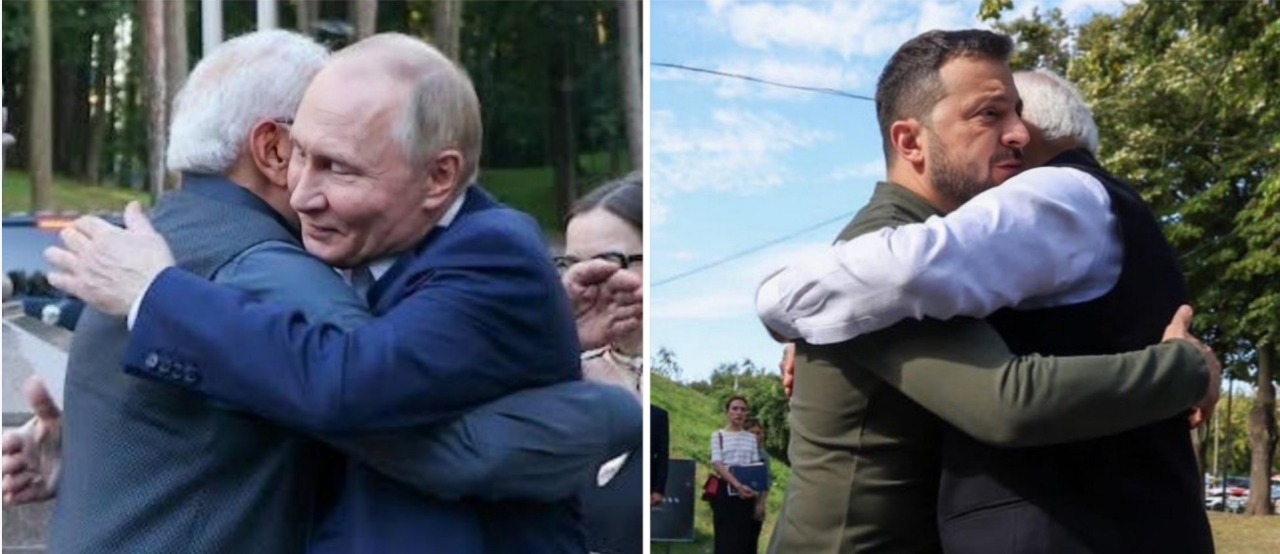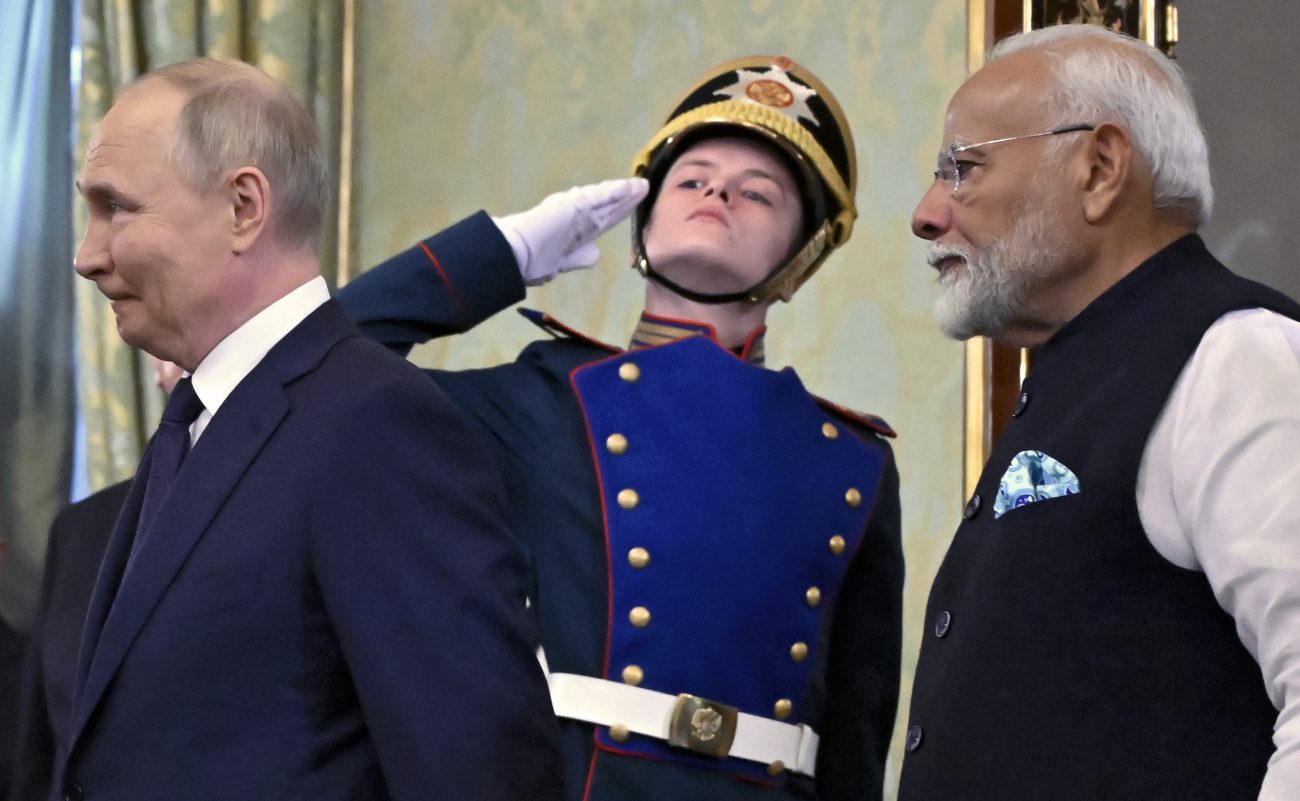India has managed to maintain ties with both Russia and Ukraine throughout the war, neither condemning Moscow outright nor turning away from Kyiv.
India’s careful mix of principle and pragmatism allows it to strengthen its global standing, especially in the Global South, while keeping alive the idea that Delhi could be a trusted broker in Europe’s bloodiest war in decades.
Russian Foreign Minister Sergey Lavrov claimed Moscow was ready to discuss a system of security guarantees with Kyiv, involving all permanent members of the UN Security Council, including China.
But President Volodymyr Zelenskyy has made it clear: China has no place at that table.
Zelenskyy told reporters that only countries which actually supported Ukraine since the invasion can be trusted with such a role.
“China did not help us stop this war from the beginning,” he said. Instead, he accused Beijing of tilting toward Moscow, first by opening its drone market to Russia and later by supplying components used in weapons production.
That single rejection of Beijing tells an interesting story about how Kyiv looks at guarantors. It also opens a space for others — and among the names being quietly discussed, India stands out.
For New Delhi, this is not just another diplomatic moment. It is a chance to shape the architecture of European security, something that seemed far beyond India’s horizons even a decade ago.
But to understand why India’s role is even being mentioned, we need to look at the last three years and the way New Delhi has walked one of the tightest ropes in modern diplomacy.
Ukraine’s Distrust of Beijing
Kyiv’s suspicion is not new. In April, Zelenskyy openly accused China of helping Russia’s arms industry, the first time he made such a direct charge.
The US and Europe share that worry. German officials have pointed out that China is now the biggest supplier of dual-use goods to Russia, while also being Moscow’s largest buyer of oil and gas.
China, for its part, insists it is neutral. “China is willing to play a constructive role,” said foreign ministry spokeswoman Mao Ning, rejecting the allegations as “groundless.” But Beijing’s ongoing economic lifeline to Moscow has already eroded its credibility with Kyiv and the West.
This credibility gap explains why Zelenskyy has no appetite for Beijing as a security guarantor. Which then raises the question: if not China, who?
Washington & Europe: Security Without NATO
The US and its allies have been exploring security guarantees that resemble NATO’s Article 5 promise of collective defense, but without actually extending membership to Ukraine. In Washington, Zelenskyy met US President Donald Trump and several European leaders to discuss these ideas.
Trump has already ruled out American boots on the ground, but hinted that air support and intelligence sharing remain possibilities. The Europeans are debating long-term arms supplies and economic support, but the essence of the problem is clear: NATO membership remains politically fraught, so alternative guarantees are being tested.
This is where non-Western actors like India enter the conversation.
Why India’s Name Came Up
Zhou Bo, a retired Chinese military officer who now writes on strategy, told Deutsche Welle last year that if peacekeepers were ever needed in Ukraine, the realistic candidates would be “China and India.”
While Kyiv has already rejected Beijing, India remains the only non-Western power with both credibility and capacity.
For India, the idea is not far-fetched. New Delhi has been one of the largest contributors to UN peacekeeping since its independence.
Its soldiers have patrolled tense borders from the Congo to Lebanon. More importantly, India has credibility with both Moscow and Kyiv, something very few capitals can claim today.

India & Ukraine: A Relationship Often Overlooked
Many forget that India and Ukraine have deeper ties than headlines suggest. Ukraine’s modern journey began in 1991, when its parliament declared independence and more than 90 percent of Ukrainians endorsed it in a national referendum.
The democratic birth of the nation echoed Mahatma Gandhi’s principle of non-violence, a value that still connects Kyiv and New Delhi.
India was quick to recognize Ukraine’s independence in December 1991, and by 1992, both countries had opened embassies. Over the years, ties expanded steadily.
By 2021, trade had crossed $3.4 billion, with cooperation spanning defense, space, and technology. Ukraine’s role in India’s naval capabilities and in developing the LVM3 rocket—later used for Chandrayaan-3—showed that the partnership went beyond commerce.
That history makes Ukraine’s openness to India as a partner more natural.
Modi Between Kyiv & Moscow
When Russia’s full-scale invasion began in 2022, India did not sit idle. New Delhi called for dialogue, avoiding the rhetoric of blocs, but consistently pushed for peace. Prime Minister Narendra Modi has since maintained a delicate but active diplomacy engaging both President Zelensky and President Putin while keeping India’s own credibility intact.
Modi’s visit to Kyiv in August 2024 was historic, the first by an Indian prime minister, and it opened a new chapter in relations.
He assured Zelensky that India was ready to contribute to peace in every possible way. Since then, the foreign ministries of both sides have been working on a roadmap that may soon become a strategic partnership.
At the same time, Modi has kept the channel with Moscow open. He continues to speak with Putin regularly, stressing India’s line: this war must end at the negotiating table, not the battlefield.
His upcoming meeting with Putin in New Delhi later this year will again underline India’s balancing act – listening to both sides, but siding only with peace.
Just this month, Modi reminded Zelensky that India is committed to “every possible contribution for an early and peaceful solution.” Days earlier, he had spoken to Putin about the same conflict. This dual-track approach, direct engagement with both Kyiv and Moscow, keeps India in a unique position few other countries can claim.
Why India Could Be A Credible Guarantor
Ukraine has been clear: guarantors must be trustworthy. China fails that test. But India?
New Delhi is not part of NATO or the Western bloc, which gives it independence in Moscow’s eyes. At the same time, India’s growing partnerships with Washington and Europe reassure Kyiv that New Delhi is not a Trojan horse for Russia.
It is one of the few countries that can speak to Putin and Zelensky in the same week and still be taken seriously by both. That credibility is exactly what Ukraine needs in any peace architecture.
Putin’s Words: “I Fully Trust Friends Like Modi”
In October 2024, Vladimir Putin was asked a pointed question: could India act as a mediator to end the Russia-Ukraine war? The Russian president was speaking to BRICS journalists when the subject came up.

Putin’s reply was, “Prime Minister Modi… yes, in every conversation with him on the phone, he raises the issue. He shares his thoughts. We are only grateful for this and welcome it. I fully trust friends like Modi.”
That statement matters. Moscow is unlikely to accept Western guarantors as neutral. China has been rejected by Kyiv. Which leaves very few options. Putin’s endorsement shows that India sits in a position where its role would not be dismissed out of hand.
It wasn’t the first time. A month earlier in Vladivostok, Putin had again named India, along with China and Brazil, as possible mediators in a future peace process.
Ever since Russia’s invasion in 2022, India has walked a careful line. Prime Minister Modi told Putin bluntly in Samarkand that “this is not the time for war,” but New Delhi has stopped short of condemning Moscow outright. Instead, India has doubled down on diplomacy, keeping channels open with both Russia and Ukraine, while also engaging the US and Europe.
In September 2022, Modi even described India’s friendship with Russia as “unbreakable,” underlining a relationship built over decades of defense and energy cooperation. At the same time, India has expanded humanitarian support for Ukraine and called for dialogue at every international forum.
Pressure From Washington, Pushback From Delhi
US President Donald Trump recently imposed new sanctions and tariffs on India, including a 25 percent levy on Russian oil purchases, effective August 27. The move was meant to curb India’s growing trade with Moscow, but New Delhi has refused to budge.
External Affairs Minister S. Jaishankar has been blunt about the double standards.
“Europe’s trade with Russia is far bigger than India’s. If buying Russian energy funds, the war, then European money does too,” he argued.
On criticism of Indian crude imports, his response was sharp: “We are buying oil to stabilize prices. It is in our national interest, but also in the global interest. If you don’t like it, don’t buy from us. Nobody is forcing you.”
Why Does India Matter in Peace Talks?
For Kyiv, India’s position may look cautious. For Moscow, it looks dependable. For Washington, it looks frustrating but pragmatic. That balance is precisely why global players keep India in the frame.
India has not armed either side. It has not endorsed either side’s maximalist goals.
India As A Mediator
India has never claimed to be neutral in the Russia–Ukraine war. What New Delhi practices is strategic neutrality, staying engaged with both sides while keeping the focus on dialogue.
Prime Minister Narendra Modi’s line, “this is not an era of war,” has become a shorthand for India’s position: peace must be pursued, no matter how difficult the road.
This message was clear when Modi met President Zelensky in Kyiv. It was echoed again when he welcomed the Alaska summit between Donald Trump and Vladimir Putin, even though the talks ended without a ceasefire.
“The world trusts us because there is no duplicity in us,” Modi later said, adding that India will support every effort for peace, whether in Ukraine or the Middle East.
Delhi’s Balancing Act
External Affairs Minister S. Jaishankar has also left the door open. In February 2025, he told Handelsblatt, a German economic daily, that India could consider mediating if approached.
He pointed out that Europe’s energy choices during the war left India with no option but to buy Russian crude. “India cannot have a view of Russia that is identical to the European one,” he said, underlining New Delhi’s independent approach.
Kyiv, meanwhile, has insisted it is open to peace but not at the cost of its land. “No country negotiates away its territory,” Jaishankar reminded Europe in another interview, a statement that resonates with India’s own experience of defending sovereignty.
Why The World Looks To India
Even voices in India’s opposition see the potential. Shashi Tharoor, a prominent politician from India, recently suggested that India could one day send peacekeepers to Ukraine, noting that “only India has a prime minister who can hug the presidents of Russia and Ukraine two weeks apart.”
That remark captures India’s unique credibility. Few countries enjoy goodwill in both Moscow and Kyiv.
The relationship also runs deeper than politics. Not long ago, India bought a ship from Russia that ran on an engine supplied by Ukraine.
Even voices in India’s opposition acknowledge this potential.
Shashi Tharoor recently suggested India might one day send peacekeepers to Ukraine, joking that “only India has a prime minister who can hug the presidents of Russia and Ukraine two weeks apart.”
His remark captures the truth: India has space in both capitals that very few countries enjoy, a quiet example of how New Delhi’s ties with both sides remain intact despite the war.
The Road Ahead
A peacekeeping role for India in Ukraine is not guaranteed. Much will depend on how the war evolves, whether serious negotiations emerge, and how much space the US and Europe are willing to concede to non-Western actors.
But even the fact that India’s name is being discussed shows how much the global landscape has shifted. In a divided world, India is one of the few countries trusted in Moscow, welcomed in Kyiv, and heard in Washington.
That is not neutrality. It is strategic independence, the ability to speak to all without being bound to any. And if peace in Ukraine ever takes real shape, that independence could turn India from a bystander into a builder of the future.
For India, mediation is not just about Ukraine; It is about showing that the Global South can shape peace, not just watch from the sidelines.
- Shubhangi Palve is a defense and aerospace journalist. Before joining the EurAsian Times, she worked for ET Prime. She has over 15 years of extensive experience in the media industry, spanning print, electronic, and online domains.
- Contact the author at shubhapalve (at) gmail.com




